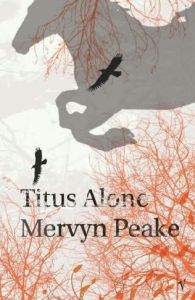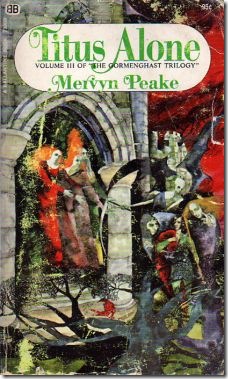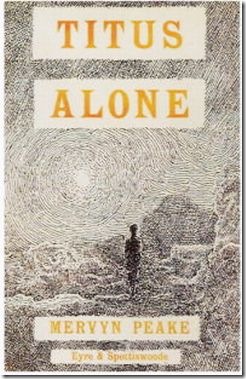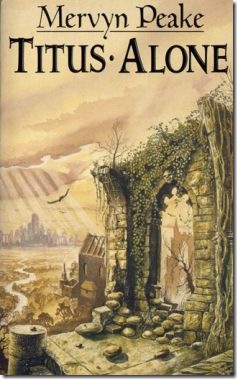Late last year, I was asked to write the introduction to Overlook Press’ new edition of Mervyn Peake’s Titus Alone, last novel of the so-called Gormenghast Trilogy. Considering that the first two books, Titus Groan and Gormenghast, had introductions written by Anthony Burgess and Tad Williams, respectively, I felt pretty honored to get the invitation.
Today I’ve received word that the books have actually come off the press and should appear in bookstores all across the U.S. soon. So, with the permission of Overlook Press, I’ve posted the introduction in its entirety below. After you’re done, go visit the Overlook Press web page for the book, and pick up a copy from Amazon. (Update 5/29/08: And also visit the Mervyn Peake blog, run by his son Sebastian. Sebastian was nice enough to write about this introduction there.)
 Now here’s the introduction. You may notice that I’ve borrowed liberally from my blog entry about Titus Alone posted over a year ago. Page numbers refer to my Vintage Press UK edition of Titus Alone (because I don’t actually have the Overlook Press edition in my hands yet).
Now here’s the introduction. You may notice that I’ve borrowed liberally from my blog entry about Titus Alone posted over a year ago. Page numbers refer to my Vintage Press UK edition of Titus Alone (because I don’t actually have the Overlook Press edition in my hands yet).
*
Did Mervyn Peake go mad writing Titus Alone, or does Titus Alone merely predict his madness? Is it a work of dystopian science fiction, or a work of psychological symbolism? Is the book a terse masterpiece, or is it just the half-formed ravings of a crumbling mind?
What the heck is this book you’re holding?
Let’s start with the facts. Mervyn Peake was a noted artist and illustrator of children’s books who spent his formative years in China. He published the novels Titus Groan (1946) and Gormenghast (1950) to excellent reviews, though not resounding commercial success. After the failure of his play The Wit to Woo (1957), Peake suffered a nervous breakdown. Parkinson’s disease, electroshock therapy, and brain surgery would follow over the next decade. Peake spent his last years in institutions, finally passing away in November of 1968. His works would dip briefly into obscurity and academic disfavor — Kingsley Amis once famously dismissed him as “a bad fantasy writer of maverick status” — before enjoying a critical and commercial renaissance that continues to this day.
Eyre & Spottiswoode originally published Titus Alone in 1959, and the book has been the target of critical dissatisfaction ever since. It’s barely half the size of Titus Groan and Gormenghast, leading some to conclude that Peake was only half-done with it. Given Peake’s mental state at the time of publication, others have assumed that the author was in no condition to write a novel. Regardless of the reason, Titus Alone is generally considered the least of the three Gormenghast books.
Why the fuss? Well, there’s no delicate way to put it: this book is bizarre. Even by the standards of the previous Gormenghast novels (which aren’t exactly models of straightforward narrative), Titus Alone stands — well, it stands alone. Titus spends the entire book wandering through a sparsely described dream world pursued by two silent, faceless policemen. He journeys through an underground realm filled with derelicts and runaways. There’s a beggar who eats money, and a remote-controlled glass spy globe. One of the main characters spends a good deal of the book with an ape on his shoulder.
In the last words of Gormenghast, Peake writes that “Titus rode out of his world.” Who would have imagined that Peake meant it literally? Titus Groan and Gormenghast take place in some undefined location in what seems to be a pre-Industrial setting. But in Titus Alone, there are flying mechanical needles, death rays, and a factory filled with mysterious bad smells. Muzzlehatch drives a car, Cheeta rides in a helicopter, and Cheeta’s scientist father talks to his subordinates through a videoconferencing system. Crabcalf informs us that someone or something named “Molusk” has recently circled the moon. (A successor to Sputnik?) All this technology implies that the novel takes place in the near future, yet nobody Titus encounters has heard of Gormenghast. Gormenghast, a castle so enormous that you can wander its rooftops for days without seeing the end of it.
But the setting isn’t the only incongruity between Titus Alone and its predecessors. The books have vast differences in style and tone as well. Peake ambles through Titus Groan and Gormenghast with page after page of (glorious, lyrical) exposition; but in Titus Alone, he takes the linguistic express route, zipping through descriptions of even central characters like Cheeta and Muzzlehatch in a mere sentence or two. The first two books make only the vaguest mentions of a higher power; this book brims over with Biblical allusions. Titus Groan is entirely sexless, and Gormenghast approaches the subject with the utmost discretion; Titus Alone is bursting with sexuality, both expressed and repressed. (Can you imagine anyone in those first two novels saying, as Titus says to Cheeta, “let me suck your breasts, like little apples, and play upon your nipples with my tongue”?) (p. 166)
So the first question to ask is this: how much of Titus Alone is Mervyn Peake switching gears, and how much is Mervyn Peake losing his marbles?
 It’s a fair question, given that so much of the novel is devoted to the question of insanity. Clearly the subject was on Peake’s mind. Titus begins to doubt the existence of Gormenghast almost as soon as he steps foot off the grounds, and his doubt is only magnified after he loses his flint. “I have nothing else to prove where I come from, or that I ever had a native land,” Titus laments. “…I have nothing to hold in my hand. Nothing to convince myself that it is not a dream. Nothing to prove my actuality.” (p. 105)
It’s a fair question, given that so much of the novel is devoted to the question of insanity. Clearly the subject was on Peake’s mind. Titus begins to doubt the existence of Gormenghast almost as soon as he steps foot off the grounds, and his doubt is only magnified after he loses his flint. “I have nothing else to prove where I come from, or that I ever had a native land,” Titus laments. “…I have nothing to hold in my hand. Nothing to convince myself that it is not a dream. Nothing to prove my actuality.” (p. 105)
Take the hallucinatory strangeness of the novel, add Titus’s doubts about his sanity, mix in Peake’s eventual descent into dementia, and you’ve got all the ingredients for the proverbial novel of madness. Let’s not forget the fact that some of the known symptoms of Parkinson’s disease include language problems, memory loss, hallucinations, and depression. Maybe the author of the fantastic we should be comparing Peake to is not J.R.R. Tolkien but Philip K. Dick, the poet of paranoia, who believed that God sent him messages through a pink laser. It’s difficult to read Titus Alone and not think of Dick’s Time Out of Joint — also published in 1959 — which features a similarly anguished protagonist living in a dream world stitched together with carefully labeled pieces of paper.
So… case closed? Mervyn Peake went mad, and Titus Alone is just a half-finished, semi-coherent product of his deteriorating mental state, right?
Wrong. Outlandish as the novel may be, it’s also tightly plotted, thematically cohesive, vividly written, and slyly self-aware. In fact, in many ways the book not only extends the themes of Titus Groan and Gormenghast, but it challenges them and turns them on their head.
We can blame two things for the popular misconceptions about Mervyn Peake’s last book. The first is the poor editing job of Peake’s original editor. The original edition of Titus Alone omitted entire chapters and contained many dubious “corrections” that weren’t fixed until years after Peake’s death. But the second and more important reason for this misunderstanding is that the book is, by nature, incomplete. Titus Alone is a bridging novel. It’s what stands between the story of Titus’s childhood and the stories of his adulthood — stories that Peake never got the chance to write.
Titus Alone can be roughly divided into three parts: Titus’s explorations of the nameless city and his first encounters with Muzzlehatch and Juno; Titus’s sojourn through the Under-River; and his strange “courtship” of Cheeta, leading up to the final pantomime in the Black House.
Peake sets up the key metaphor of the novel early on, in Chapter 13, during the fight between Muzzlehatch’s camel and his mule. The two animals break free of their cages and set on each other with a frenzy, until they’re stopped by a naked Muzzlehatch wielding a hose and wearing a fireman’s helmet. (I did mention that the novel was bizarre, right?) Look at how Peake describes the animals’ walk back to their cages:
But the camel and the mule were anything but embarrassed. They had tasted freedom and they had tasted blood, and it was with a quite indescribable arrogance that they swaggered towards the cages, their thick, blue lips curled back over their disgusting teeth; their nostrils dilated and their eyes yellow with pride. (p. 25)
Clearly Peake’s not just talking about animals here; he’s deliberately drawing a parallel between the animals escaping from their cages and Titus Groan escaping from Gormenghast. Titus says so himself. (“Gormenghast was a kind of jail,” he tells the Magistrate. “A place of ritual. But suddenly and under my breath I had to say good-bye.”) (p. 86) And in case you missed that reference, there are several more: Titus locked in prison like “some kind of caged animal,” (p. 63) Titus asking Cheeta “Why can’t you set me free?” (p. 223), Titus “like a dancing bear on the end of a rope.” (p.171) As for the tasting of blood — wasn’t one of Titus’s last acts in Gormenghast to kill the traitorous Steerpike?
 But it’s not just Titus that Peake wants to compare to an animal in a cage; these animal metaphors extend throughout the book. We’ve got characters named Cheeta, Muzzlehatch, Cusp-Canine, and Crabcalf. We’ve got characters compared to condors, crocodiles, foxes, snakes, birds, jackals, squirrels, tigers, tortoises, dogs, cats — the list goes on. At one point, while Titus is on the glass roof looking down on Lady Cusp-Canine’s party, he imagines the whole crowd as some kind of menagerie:
But it’s not just Titus that Peake wants to compare to an animal in a cage; these animal metaphors extend throughout the book. We’ve got characters named Cheeta, Muzzlehatch, Cusp-Canine, and Crabcalf. We’ve got characters compared to condors, crocodiles, foxes, snakes, birds, jackals, squirrels, tigers, tortoises, dogs, cats — the list goes on. At one point, while Titus is on the glass roof looking down on Lady Cusp-Canine’s party, he imagines the whole crowd as some kind of menagerie:
They were all there. The giraffe-men and the hippopotamus-men. The serpent-ladies and the heron-ladies. The aspens and the oaks; the thistles and the ferns — the beetles and the moths — the crocodiles and the parrots: the tigers and the lambs: vultures with pearls around their necks and bison in tails. (p. 38)
I tried to keep a running list of all the animal metaphors in Titus Alone, but finally I gave up and stopped counting at forty.
So in the first third of Titus Alone, our hero endlessly rehashes his escape from the prison of Gormenghast, the prison of being the 77th Earl of Groan. He soon finds himself in the dark and mysterious world of the Under-River, the symbolism of which should be obvious to anyone who’s ever taken a class in English literature. Dark passages, birth canals, furtive adolescent scrambling — you know the drill.
After his dark underground journey, in the last third of Titus Alone, Titus finally finds what he’s looking for — or at least what he thinks he’s looking for. He’s lived his entire life in the confines of Gormenghast, a place of stultifying ritual, where tradition rules for tradition’s sake and any breach of protocol is a mortal sin. What he finds in Cheeta, her scientist father, and his factory is the opposite extreme. What could be more unlike Gormenghast than a place of invention and experimentation? Peake hammers the point home by continually referring to Cheeta and the scientists in terms of newness and invention. Cheeta is a “modern” with “a new kind of beauty” (p. 160); she takes Titus to the Black House to see “a hundred bright inventions.” (p. 213) She implores him to spend one last night with her, “not in some dusky arbour where all the ritual of love drags out for hours, and there is nothing new; but in the bright invention of the night, our egos naked and our wits on fire.” (p. 194)
Yet for all their differences from the ancient, moldering castle, Cheeta and her father clearly represent a kind of evil, like the relentlessly ambitious Steerpike in the first two books. Notice that despite all the air of newness about the factory, it never seems to actually make anything; all the scientists accomplish is the destruction of Muzzlehatch’s zoo with their death ray. (You’ll remember that the forward-thinking Steerpike never accomplished much in Gormenghast either, except to burn down the library.)
It’s hard to see anything noble about Gormenghast in the first two novels. The castle never felt particularly malignant in itself, but all those centuries of relentless tradition did seem to have a malignant effect on its inhabitants. The only proper reaction to such immenseness is to close oneself off, like Sourdust and Barquentine and — well, just about every other character in Titus Groan and Gormenghast. But in the last third of Titus Alone, Peake shows us that there’s an entirely different side to the castle. As Cheeta discovers, living in the shadow of all that monumental history has given Titus a strength of character that she lacks:
From the cold centre of elegance and a life of scheduled pleasure she was now being shown the gulches of a barbarous region. A world of capture and escape. Of violence and fear. Of love and hate. Yet above all, of an underlying calm. A calm built upon a rock-like certainty and belief in some immemorial tradition.
Here, tossing and sweating on the bed below her, lay a fragment, so it seemed, of a great tradition: for all the outward movement utterly still in the confidence of its own hereditary truth. Cheeta, for the first time in her life, felt in the presence of blood so much bluer than her own. (p. 162)
Gormenghast, a place that ennobles the soul? A place that provides Titus with the foundations to survive and thrive in the world? It’s enough to make you reevaluate all of the truths you thought you knew from reading Titus Groan and Gormenghast.
 By the conclusion of Titus Alone, the 77th Earl of Groan has come to a kind of acceptance with his past. He’s escaped from the prison of stifling tradition, he’s rejected the false promise of the new, and he’s confronted the demons of his upbringing and overcome them. Why, then, does Titus reject Gormenghast in the book’s final pages? Why does he turn away from the castle with a fairy-tale finality, to be “never seen by him ever again”?
By the conclusion of Titus Alone, the 77th Earl of Groan has come to a kind of acceptance with his past. He’s escaped from the prison of stifling tradition, he’s rejected the false promise of the new, and he’s confronted the demons of his upbringing and overcome them. Why, then, does Titus reject Gormenghast in the book’s final pages? Why does he turn away from the castle with a fairy-tale finality, to be “never seen by him ever again”?
Clearly Mervyn Peake was not finished with Titus Groan. We know that Peake planned to write further episodes in the saga, with tentative titles that include Titus Awakes and Gormenghast Revisited. Unfortunately all the author ever put to paper were scattered notes and fragments. I’d like to think that Titus goes on to achieve great deeds, now that he’s armed with the mighty tradition of Gormenghast but not controlled by it. What final destiny Peake had in store for him, we’ll never know.
The more I study Titus Alone, the more I realize that Peake knew precisely what he was doing with this book. Perhaps the author didn’t have the opportunity to polish his last Titus story to the same bright sheen as Titus Groan and Gormenghast. There are some individual passages that have a sketched-out or unfinished quality to them. (Who exactly is this village girl that Titus is frolicking with shortly before the book’s climax? What exactly does it mean that Juno’s hallway was “daringly yet carefully… furnished”?) (p. 66)
Still, I can’t imagine that a Mervyn Peake at the height of his intellectual powers would have produced a book much different than the one you’re holding right now. Titus Alone may stand alone, but it stands on its own two feet.